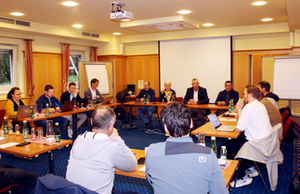Expert commissions meet to shape the future of luge

St. Leonhard/Salzburg (FIL/02 Apr 2025) The International Luge Federation (FIL) held its annual meeting of the expert commissions from March 31 to April 2, 2025 at the Hotel Untersberg in St. Leonhard near Salzburg.
For three days, distinguished officials, commission members and sports experts met to review the past season, discussed critical developments and determined the strategic direction for the future of the sport of luge.
Several important topics were on the agenda, starting with a review of the 2024/2025 season, an analysis of the lessons learned, and planning for the upcoming FIL sports calendar for 2025/2026 and beyond. Key discussions included jury assignments for upcoming major events such as the Milano-Cortina 2026 Olympic Winter Games and the 41st FIL Junior World Championships in Altenberg, Germany. In addition, bids for future FIL World Championships for the general class and juniors up to the year 2029 were reviewed.

One of the main topics of the Sport Commission were the Olympic rules, including the preparations for the International Training Week in Cortina.
The Youth Commission, chaired by Hans Jürgen Köhne, presented a revealing report on ongoing development programs.
Sports Director Matthias Böhmer was pleased: “We had very productive meetings and were able to make important decisions and proposals to the Congress. For example, the Sport Commission views the introduction of the Mixed World Cup very positively and supports the retention of the original start heights. In addition, the group advocates a reaction start for the first sled and an application for the Olympic program in 2030.”
The open discussion sessions allowed members to provide feedback and deliberate on important topics such as the validity period of competition vouchers, formats and event character for FIL Luge World Championships, a possible participation in international multi-sport events such as the Asian Winter Games, FISU Games and Invictus Games and the long-term direction of the FIL's development programs.

In the Technical Commission, for example, the refinement of the reaction start mechanism for the team relay was discussed. In the future, the spring tension of the touch pad in the IRO is to be set at 4 kilograms. If the starting gate does not open because the mechanism on the touch pad at the finish has not been triggered, it is clear that the four kilos were not reached. Furthermore, the standardized sled parts and their implementation in the next few years were discussed in detail, along with the introduction of a questionnaire to collect athletes' opinions and suggestions.
The Commission for Natural Track and Public Sledding discussed future-oriented topics. Vice President for Natural Track Sorin Buta (ROU) spoke of “very productive discussions and a new concept for the future of Alpine Luge”, which is to be the new umbrella term for natural track and public sledding.

Sports Director Andreas Castiglioni (ITA) even spoke of a “historic meeting” in which decisions were made regarding IRO changes, a new piece of sports equipment, applications for championships from 2026 to 2029, a focus on the singles discipline and the results and changes of the ten working groups for the ‘Future Workshop Natural Track & Public Sledding’. “Alpine Luge” is to be introduced soon.
The FIL commissions' meetings culminated in a joint final meeting session to ensure a coordinated approach to future progress in luge.
The FIL remains committed to the continued growth and innovation of the sport, and these expert meetings play a crucial role in shaping the future of the sport of luge. “The FIL thanks all participants for their valuable contributions and looks forward to implementing the agreed strategies in the coming seasons,” FIL President Einars Fogelis concluded.









